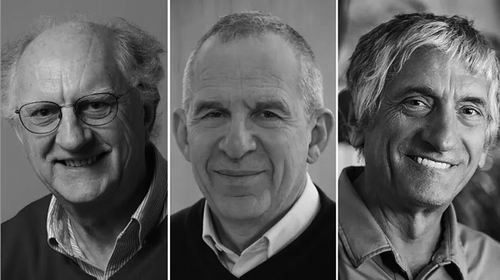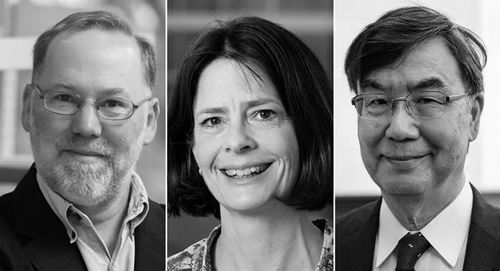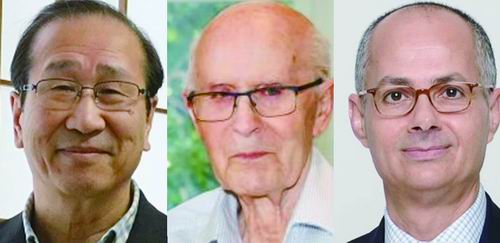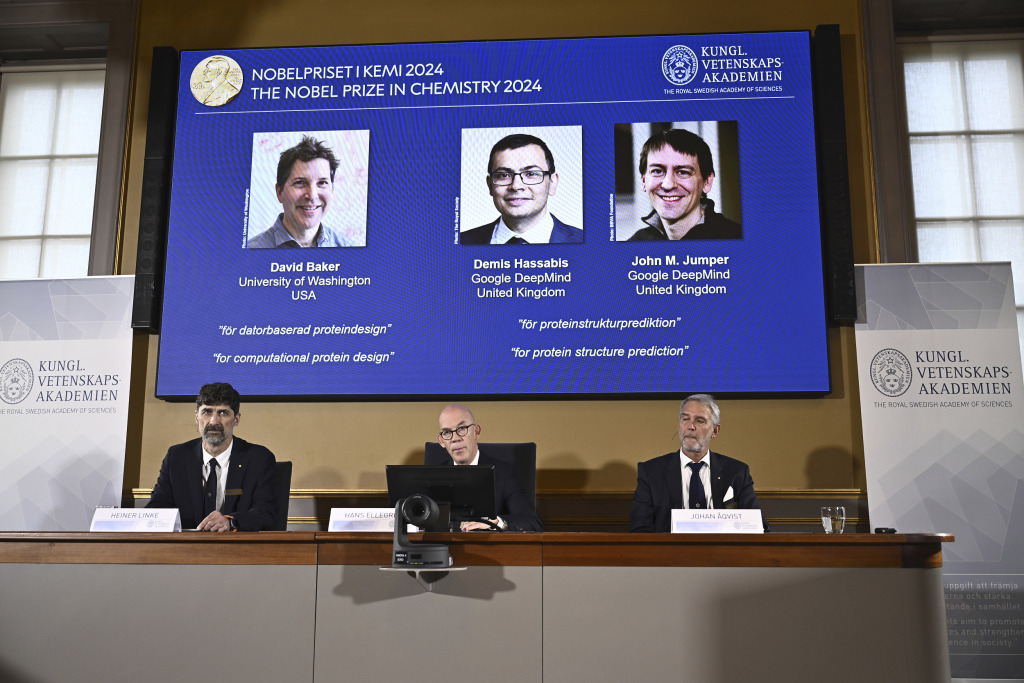

John Clark (left), Michelle Devoret (center) and John Martinis.
In 2025, the centenary of the birth of quantum mechanics, a new Nobel Prize in Physics was added to this field.
On October 7, the 2025 Nobel Prize in Physics was announced and awarded to American scientists John Clarke, Michel Devoret and John Martinis in recognition of their "discovery of macroscopic quantum mechanical tunneling effects and energy quantization in circuits."
"I was completely stunned. I never thought I would win the Nobel Prize," Clark said when he learned he had won. In 1984 and 1985, Clark, along with his postdoc Devoret and student Martinis, conducted a series of experiments on electronic circuits constructed from superconductors, proving that quantum physics not only exists in the microscopic world, but its unique properties can also be manifested in macroscopic systems as small as the palm of your hand.
Olle Eriksson, chairman of the Nobel Committee for Physics, said: "It is wonderful to celebrate a century of quantum mechanics, which continues to bring new surprises. Quantum mechanics is extremely useful because it is the basis of all digital technologies."
“The award seems to have been given a little too early.”
China Science Daily: After three years, the Nobel Prize in Physics was again awarded to the field of quantum mechanics. What do you think about this?
Liang Wenjie, a researcher at the Institute of Physics, Chinese Academy of Sciences : "I didn't expect macroscopic quantum effects and energy quantization to win the award. But on reflection, these are indeed relatively fundamental concepts, and the awards are quite reasonable. However, since these two concepts haven't yet achieved revolutionary results in their applications, the award seems a bit premature. This is my personal assessment."
Guo Guoping, professor at the University of Science and Technology of China and deputy director of the Key Laboratory of Quantum Information of the Chinese Academy of Sciences: First of all, I think this Nobel Prize is quite bold. After all, the superconducting route to quantum computing has not yet been fully developed or will definitely succeed. Secondly, I think this represents the encouraging attitude of the Western scientific community towards quantum computing and is a kind of guidance.
An anonymous scientist working on superconducting quantum computing research stated : "Purely my personal opinion, I think it's premature. Perhaps the most convincing outcome would be to wait until superconducting quantum computers are truly realized before awarding them. Because once a superconducting quantum computer is truly realized, it will directly change the way humans process information."
But this is exactly what I want to call for. I'm particularly worried that after the Nobel Prize is awarded to the pioneers of superconducting quantum computing, people will assume that superconducting quantum computers are imminent. I'm even more worried that those with ulterior motives will overhype and even exploit quantum computers. This would be a disservice to those of us who are truly working on superconducting quantum computing.
Li Xiaopeng, Professor of Physics at Fudan University : "Before the award ceremony, I was thinking that this year's Physics Prize would most likely go to a scientist in the quantum field, as this year marks the 100th anniversary of modern quantum mechanics. I didn't expect these three scientists to receive the award, but they are absolutely deserving. As a quantum researcher, I'm very excited and inspired."
Li Liang, Professor at the School of Physics and Astronomy at Shanghai Jiao Tong University , said: "Although macroscopic quantum mechanics tunneling and energy quantization are relatively niche fields, they at least belong to physics. Therefore, upon hearing that the Physics Prize was awarded to this field, I felt a sense of relief. The Physics Prize has finally "returned to normal."
The Nobel Prize selection process has undergone significant changes over the past two years, likely a result of the Nobel Committee's efforts to keep pace with the times. This year, while emphasizing fundamental and cutting-edge theory, it also closely links it to practical applications. In this sense, the Nobel Committee has put in a lot of effort.
Laying the foundation for the development of superconducting quantum computing
China Science Daily: Could you briefly introduce the "macroscopic quantum mechanics tunneling effect and energy quantization"? What is the "use" of this research?
Liang Wenjie : The "quantum tunneling effect," in layman's terms, is like a Taoist priest chanting an incantation and then passing through a wall. This is a fundamental characteristic of quantum mechanics. This year's Nobel Prize mentions "macroscopic quantum tunneling," which refers to tunneling effects that can be observed at macroscopic scales, meaning millimeter-scale or even larger. A common macroscopic quantum effect around us is superconductors.
"Energy quantization" means that energy can only change in small increments. Just like water flowing through a tap, under classical conditions, to increase the flow rate, you need to turn the tap on. However, if it is quantized, for example, the flow rate can only be 1, 2, or 3 cubic meters per second, but 1.5 cubic meters per second is impossible. Several Nobel laureates have discovered that macroscopic circuits also exhibit quantized behavior, which can be exploited for precise energy and information transmission and calibration.
Traditionally, quantum tunneling has only been observed in very small systems. This award-winning work demonstrates that quantum tunneling can also occur in handheld devices, and reveals the energy quantization effect. This effect has the potential to become the foundation of future circuits, meaning that electronic circuits will no longer rely solely on the number of electrons to control information, but rather through the coherent manipulation of the phase of a large number of electrons. This is likely what the Nobel Committee values most.
Li Xiaopeng : The two Nobel Prizes were awarded in very different fields. Quantum mechanics was originally developed to explain the behavior of very microscopic particles like atoms and electrons. In 2022, three scientists were awarded for demonstrating quantum entanglement at the single-photon scale. This year's three laureates discovered quantum tunneling and energy quantization in macroscopic devices.
Previously, scientists hadn't known whether quantum phenomena could be observed in macroscopic artificial devices. However, by designing a superconducting circuit system, the three researchers successfully observed quantum mechanical effects, overturning previous understanding. This discovery laid the foundation for the subsequent development of superconducting quantum computing, which is the basis for the superconducting quantum computing approach currently being promoted by Google.
Li Liang : The tunneling effect and energy level quantization are fundamental physical concepts in quantum mechanics and are closely related to next-generation quantum technologies. Technologies such as qubits, quantum computing, quantum sensing, and quantum cryptography all originate from these concepts. Without energy level quantization, none of these quantum circuit functions would be possible.
Anonymous scientist : In the field of quantum mechanics, a natural question is whether quantum mechanics also applies to macroscopic systems. Their experiment 40 years ago scientifically demonstrated that macroscopic systems also follow the laws of quantum mechanics. They reduced interference such as temperature and noise to extremely low levels in the circuit, proving that the same quantum effects exist in macroscopic systems. This directly led to the development of superconducting quantum computing. In short, firstly, it has profound physical insights—the scope of quantum mechanics—and secondly, it has promoted the birth and development of superconducting quantum computing.
Just because you win a Nobel Prize doesn't mean you have a bright future.
China Science Daily: What impact will this award have on the future development of quantum mechanics and related fields? What is my country's plan?
An anonymous scientist stated : While the three pioneers pioneered the path to superconducting quantum computing, they also pointed out the challenges involved—reducing noise, temperature, and other interference factors in macroscopic quantum systems to the single-quantum level. This is particularly true once scale is achieved. The scientific and engineering challenges behind this are extremely complex. Therefore, I urge everyone to remain patient with quantum computer research and development. This field doesn't necessarily have a bright future or smooth sailing simply because it has won a Nobel Prize.
Luo Weidong, Professor of Physics and Astronomy at Shanghai Jiao Tong University , said: "This year's Nobel Prize was awarded to them primarily for their research on superconducting Josephson junctions, which exhibit macroscopic quantum properties, including quantum tunneling and quantized energy levels. This is the foundation for developing next-generation quantum technologies. I believe it is the most important technological path for building future quantum computers, and it will encourage and promote the development of quantum computing in China."
Li Xiaopeng : Quantum computing is currently moving from the laboratory to practical applications. We are also closely watching whether quantum computing can demonstrate its application advantages in some valuable problems, but concrete implementation will take time. This is indeed a great era for the development of quantum technology. Winning the Nobel Prize is only one aspect. Going forward, it will undoubtedly attract increasing attention from all walks of life, driving the development of quantum computing from basic science to application.
Liang Wenjie : Current mainstream quantum computing approaches include superconducting quantum computing, optical quantum computing, cold atom quantum computing, and silicon spin quantum computing. Superconducting quantum computing is probably the closest to engineering success. Currently, the team led by Academician Pan Jianwei at the University of Science and Technology of China has made significant contributions to this field. Numerous institutions, including the Institute of Physics of the Chinese Academy of Sciences and Fudan University, are also contributing. Chinese quantum computing has a significant impact globally.
The honor does not only belong to the "big guys"
China Science Daily: Have you ever met any of the award winners? What impression do they leave on you?
Luo Weidong : The oldest is Clark, who has been teaching at the University of California, Berkeley. Over 20 years ago, when I was a doctoral student in the physics department there, I often ran into him in the physics building. He had a very distinctive personality: a tall, smiling old man.
Anonymous scientist : Many of the people working on quantum computing in the US today are Clarke's disciples. Clarke truly had the demeanor of a great scientist. I remember one meeting where his students surrounded him, enthusiastically discussing quantum computing.
Devoret is a very persistent person. I remember once at a conference in Japan, after he finished his presentation, I approached him to ask a few academic questions. He was very rigorous, carefully asking me what the questions were, and then answering them in detail. Martinis, on the other hand, is a very active and open-minded person, and there are many legends about him.
Guo Guoping : Our research group hasn't collaborated with these three scientists, but we met them at several conferences in the early years. Martinis is probably the most famous of them. He played an invaluable role in building Google's quantum computer. Martinis is a very dedicated scientist, deeply focused on technical details, with extremely high technical requirements, and always able to make progress step by step.
Li Xiaopeng : I've met Martinis at conferences, shared drinks, and chatted with him. He's a typical American scientist, passionate about his research and very easygoing, always willing to mingle with young people and discuss scientific issues.
The last time I met him was in 2018, when we discussed the future direction of superconducting quantum computing. That year coincided with a crucial milestone: Martinis led a team in developing Bristlecone, a new 72-qubit quantum processor. This work reduced the error rate of superconducting qubits to the threshold for quantum error correction, suggesting the possibility of a superconducting quantum computer in the future. At the time, Martinis expressed great confidence in the development of superconducting quantum computers. Looking back, the development trend of superconducting quantum computing has been consistent with his predictions. For example, in December 2024, Google released its latest quantum chip, Willow, but by then Martinis had already left Google.
Liang Wenjie : There are relatively few teacher-student combinations that win the Nobel Prize, which encourages all young teachers and students. The honor does not only go to the "big guys", the contributions of the three of them to this achievement have been recognized.
China Science Daily: What inspiration can we get from the awarding of this Nobel Prize?
Guo Guoping : As a practitioner, I just feel that the pressure on my shoulders is greater and the burden is heavier.
Li Xiaopeng : I believe that China's quantum technology, including quantum computing, quantum communication, and quantum precision measurement, has reached the same level as that of foreign countries. However, we must also admit that there is still a certain gap between China and the United States in basic scientific innovation and talent accumulation.
Luo Weidong : This year's Nobel Prize went to the field of condensed matter physics. Most research in condensed matter physics is done by small teams, consisting of a single advisor and a few students and postdocs. Often, small research teams conducting independent, exploratory research can also make significant contributions.
Liang Wenjie : I think every young researcher should find a field that makes their eyes light up when they talk about it. It doesn’t matter whether this field can win the Nobel Prize. The key is whether you are interested in it and think that this work is particularly important and worth pursuing for a lifetime.


